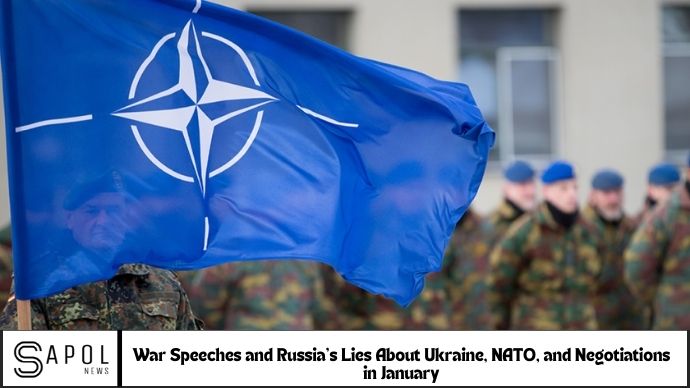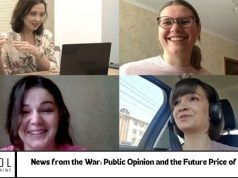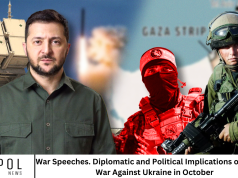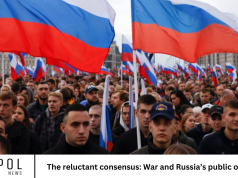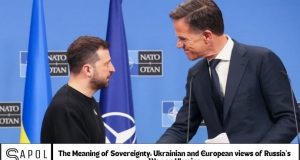War Speeches. Negotiations, War with NATO and the “Absence” of Ukraine: What Did Russia Lie About in January
January 2024 was dominated by a wave of Russian information operations. The Kremlin leveraged all available media channels to sow division between the Ukrainian people and their government, while simultaneously denying the existence of a distinct Ukrainian identity. Russia also feigned interest in negotiations, hoping to buy time and divert global attention from the ongoing war in Ukraine. However, the increasingly aggressive actions and rhetoric of Russian ultra-nationalists pushed Europe to seriously contemplate the threat of direct military confrontation with the Russian Federation.
A key objective of Russia’s disinformation campaign has been to undermine Western support for Ukraine. Moscow attempts to discredit Ukraine’s political and military leadership, manipulating sensitive topics to deflect attention from its own war crimes, destabilize the situation in Ukraine, and erode international support.
The following sections delve into the context and purpose behind some of the prominent Russian narratives that emerged in January.
Key Lies in Russia’s War Speeches: Fact vs. Fiction
Russia has used war speeches to justify its actions and position in the ongoing conflict. However, many of these claims have been challenged by experts, officials, and global organizations. Let’s break down some of the most significant falsehoods:
1. Ukraine’s “Absence” in Negotiations
Russian officials have repeatedly claimed that Ukraine has refused to engage in meaningful negotiations. In January, Russian President Vladimir Putin’s statements implied that Ukraine’s government was unwilling to sit at the table for peace talks. However, this narrative ignores the fact that Ukraine has consistently called for Russian withdrawal from its territory as a precondition for any negotiations.
- Fact: Ukraine has shown willingness to negotiate, but only under terms that guarantee its sovereignty.
- Misleading Claim: Russia paints Ukraine as uninterested in peace talks, a narrative that plays into the justification for continued aggression.
2. NATO’s Role in the Conflict
Another key element of Russia’s speeches is the blame placed on NATO for the conflict’s escalation. Russian officials often argue that NATO’s expansion threatens Russia’s security, and this is cited as a reason for the invasion of Ukraine. In January, Russia again claimed that NATO is directly involved in the war, despite clear evidence that NATO countries are providing support to Ukraine, but not directly engaging in combat.
- Fact: NATO has offered military and humanitarian support to Ukraine but has not directly intervened in the conflict.
- Misleading Claim: Russia implies that NATO is actively fighting alongside Ukraine, which is a distortion of reality.
3. Ukraine’s Military “Absurdities”
In his speeches, Putin has described Ukraine’s military as ineffective and disorganized, often making false claims about its inability to defend itself. These assertions are part of Russia’s broader strategy to portray Ukraine as a weak and unstable state. However, the Ukrainian military has proven to be highly resilient, managing significant counterattacks and regaining territory from Russian forces.
- Fact: Ukraine’s military, with training and equipment support from Western allies, has achieved significant battlefield successes.
- Misleading Claim: Russia attempts to undermine Ukraine’s military capabilities, which only fuels propaganda supporting their continued war efforts.
4. Claims About Civilians in Ukraine
Russia has also made statements about the alleged treatment of civilians in Ukraine, suggesting that Ukraine is using civilians as human shields or is otherwise causing harm to its own people. These false claims ignore the documented war crimes committed by Russian forces, including the targeting of civilian areas and atrocities in places like Bucha and Mariupol.
- Fact: Multiple international organizations have condemned Russian actions as war crimes.
- Misleading Claim: Russia attempts to deflect blame for civilian casualties by accusing Ukraine of similar tactics.
Implications of Russia’s Lies: A Global Perspective
These false narratives and misrepresentations not only affect the Ukrainian people but also have serious repercussions for global diplomacy. The spreading of lies serves several strategic purposes:
- Justifying Aggression: By distorting the facts, Russia seeks to legitimize its actions in the eyes of its domestic audience and global sympathizers.
- Disrupting Peace Talks: Misinformation makes it harder for peace talks to progress, as distrust and misinformation cloud any potential resolution.
- Polarizing Public Opinion: False claims influence global public opinion, sometimes turning countries that would otherwise support Ukraine into more neutral or antagonistic actors.
These tactics are designed to slow international pressure on Russia and extend the war, while also undermining Ukraine’s position.
May you also like it:
Diplomacy Watch: Ukrainian Public Opinion More Divided Than Ever
Ukrainian Public Opinion on Compromise with Russia Changing, Researcher Explains
Ukrainian Opinion Survey Tracks Fluctuating Views on Quick End to War
Conclusion
Russia’s speeches in January 2025 are filled with distortions meant to mislead and confuse. Understanding these falsehoods is essential for governments, diplomats, and the global public to respond effectively. For Ukraine, countering these lies is crucial in protecting its sovereignty and pushing for genuine peace talks. The international community must continue to debunk Russian misinformation and support Ukraine’s right to self-defense and a negotiated resolution that respects its territorial integrity.
FAQs:
What false claim did Russia make about Ukraine’s negotiations?
Russia falsely claimed that Ukraine was unwilling to engage in peace talks, despite Ukraine’s conditional willingness.
Is NATO directly involved in the war in Ukraine?
No, NATO provides support to Ukraine but has not participated directly in military combat.
What does Russia say about Ukraine’s military?
Russia claims Ukraine’s military is weak and ineffective, though Ukraine has achieved significant military successes.
How does Russia misrepresent civilian casualties in Ukraine?
Russia accuses Ukraine of harming its own civilians, deflecting attention from its own war crimes.
What is the impact of Russia’s lies on global diplomacy?
Russia’s false narratives disrupt peace efforts, justify continued aggression, and polarize international opinion.
What should the international community do in response?
The international community must actively debunk Russian misinformation and continue supporting Ukraine’s right to peace and sovereignty.

